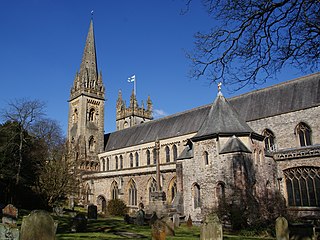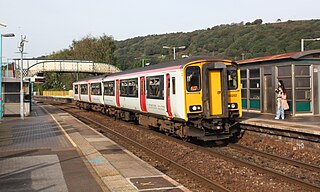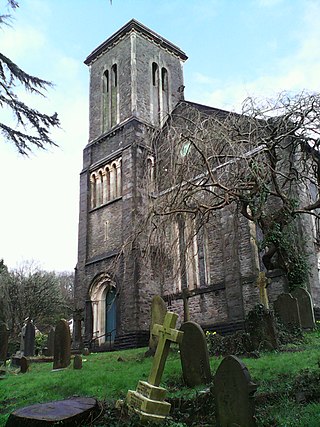
Aberdare is a town in the Cynon Valley area of Rhondda Cynon Taf, Wales, at the confluence of the Rivers Dare (Dâr) and Cynon. Aberdare has a population of 39,550. Aberdare is 4 miles (6 km) south-west of Merthyr Tydfil, 20 miles (32 km) north-west of Cardiff and 22 miles (35 km) east-north-east of Swansea. During the 19th century it became a thriving industrial settlement, which was also notable for the vitality of its cultural life and as an important publishing centre.

Llandaff Cathedral is an Anglican cathedral and parish church in Llandaff, Cardiff, Wales. It is the seat of the Bishop of Llandaff, head of the Church in Wales Diocese of Llandaff. It is dedicated to Saint Peter and Saint Paul, and three Welsh saints: Dubricius, Teilo and Oudoceus. It is one of two cathedrals in Cardiff, the other being the Roman Catholic Cardiff Metropolitan Cathedral in the city centre.

Pontypridd, colloquially referred to as Ponty, is a town and a community in Rhondda Cynon Taf, South Wales, approximately 10 miles north west of Cardiff city centre.

The Taff Vale Railway (TVR) was a standard gauge railway in South Wales, built by the Taff Vale Railway Company to serve the iron and coal industries around Merthyr Tydfil and to connect them with docks in Cardiff. It was opened in stages in 1840 and 1841.

Rhondda Cynon Taf is a county borough in the south-east of Wales. It consists of five valleys: the Rhondda Fawr, Rhondda Fach, Cynon, Taff and Ely valleys, plus several towns and villages away from the valleys.

Treforest is a village in the south-east of Pontypridd, in the county borough of Rhondda Cynon Taf, Wales. It is situated in the Treforest electoral ward, along with the village of Glyntaff. It is part of the Pontypridd Town community. Treforest runs along the west bank of the River Taff, while Glyntaff runs along its east bank.

Abercynon is a village and community in the Cynon Valley within the unitary authority of Rhondda Cynon Taf, Wales. The community comprises the village and the districts of Carnetown and Grovers Field to the south, Navigation Park to the east, and Glancynon to the north.

Rhydyfelin is a large village and part of the community of Pontypridd Town, about two miles to its south east of Pontypridd, in the county borough of Rhondda Cynon Taf. It is on the eastern bank of the River Taff close to the A470, and historically was in the parish of Eglwysilan.

Pontypridd United FC is a Welsh football club, based in Pontypridd. The club play at USW Sports Park on Treforest Industrial Estate. The club plays in the Cymru South.
Pontypridd Graig railway station was a railway station located in the South Wales valleys town of Pontypridd, on the Barry Railway. Although the line was opened for mineral traffic on 18 July 1889 to take coal from Rhondda to the Docks, the passenger service did not start until 16 March 1896 after much lobbying from local residents along the line. On that date, Barry services commenced between the Taff Vale station at Porth and Barry where the train terminated in the bay platform. On 7 June 1897, a new passenger service began between Pontypridd and Cardiff Clarence Road via St Fagans and Cardiff Riverside. Train journeys commenced at Pontypridd because the Taff Vale was not willing to allow direct competition with its own services from Porth to Cardiff Queen Street. The station was closed to passengers on 5 May 1930 by the GWR who diverted trains via Treforest Junction to its main station at Pontypridd Central.

Pontypridd railway station serves the town of Pontypridd in Rhondda Cynon Taf, Wales. It is located at the junction of the Merthyr line and the Rhondda line and has for many years been the only station serving the town.

Treforest Estate railway station is a small railway station in Treforest, near Cardiff, built to serve the workers and visitors of Treforest Industrial Estate. It is located on the Merthyr Line, 8.7 miles (14 km) north-west of Cardiff Central.

Treforest railway station is a railway station serving the village of Treforest, Rhondda Cynon Taf, Wales. It is located on the Merthyr Line and the Rhondda Line 18 km north west of Cardiff Central. Passenger services are provided by Transport for Wales.

The Diocese of Llandaff is an Anglican diocese that traces its roots to pre-Reformation times as heir of a Catholic bishopric. It is headed by the Bishop of Llandaff, whose seat is located at the Cathedral Church of Saint Peter and Saint Paul in Llandaff, a suburb of Cardiff. It currently covers most of the former Welsh county of Glamorgan, but once stretched from the River Towy to the middle of the Wye Valley.

Dubricius or Dubric was a 6th-century British ecclesiastic venerated as a saint. He was the evangelist of Ergyng and much of south-east Wales.
Devereux is a Norman surname. Derived form of D'Evreux / Devreux, meaning d'Évreux, the surname is found frequently in Ireland, Wales and England and to a lesser extent elsewhere in the English-speaking world. Saint Devereux Church in Hereford, United Kingdom is also named Saint Dubricius and is dedicated to the 6th century clergyman Saint Dubricius from Hereford, suggesting that the name is a Norman French rendering of Dubricius or the saint's Welsh name Dyfrig. In Ireland, the name is associated with Wexford, where the Cambro-Normans first invaded from Pembrokeshire, Wales in 1170. Anglo-Norman develops regularly a svarabakhti vowel /e/ between /v/ and /r/, such as in overi, or livere. Dubricius is called Dubrice in French and Dyfrig would have given *Difry / *Dufry in French and *Difery / *Dufery in Anglo-Norman, and St. Devereux is probably a mistranslation after the surname Devereux. The French variant is Devreux, which unlike Devereux is found within Normandy and France themselves.

Tonteg is a village in Rhondda Cynon Taf in South Wales. It is 4 miles (6.4 km) from Pontypridd, 9 miles (14.5 km) north west of Cardiff and 4 miles (6.44 km) north east of Llantrisant. The village is within the community of Llantwit Fardre. Tonteg is to the north west of the Garth Mountain, on the west side of the River Taff valley, at the top of a hill known locally as Powerstation Hill. The hill gets its name from the Upper Boat power station which was situated at the bottom of the hill until it was demolished in 1972. Tonteg is next to Church Village and the boundaries between the two villages are blurred. A significant part of the Treforest Industrial Estate falls within the Willowford area of Tonteg.
The Pontypridd Deanery is a Roman Catholic deanery in the Archdiocese of Cardiff-Menevia, previously in the Archdiocese of Cardiff, which covers several churches and the university chaplaincy in Pontypridd and the surrounding area of Rhondda, the southernmost part of the Cynon Valley, and Caerphilly. In the early 2000s, the Head of the Valleys deanery was split. The churches in its western part, in the county boroughs of Merthyr Tydfil and Rhondda Cynon Taf, became part of the Pontypridd deanery and the churches in its eastern part, in the county borough of Blaenau Gwent, became part of the North Gwent Deanery.

Saint Teilo, also known by his Cornish name Eliud, was a British Christian monk, bishop, and founder of monasteries and churches. He was from Penalun (Penally) near Tenby in Pembrokeshire, south Wales.

St Mary's Church is a Church in Wales parish church in the village of Glyntaff, near Pontypridd, South Wales. It is the oldest Anglican church in the Pontypridd urban area. Formerly an independent parish, it became part of the Parish of Glyntaff, Rhydyfelin and The Graig, and is now part of the Parish of Pontypridd. It is a member of Pontypridd Christians Together.



















